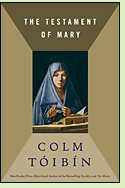The Testament of Mary
by Colm Tóibín
Reviewed by Margaret Donsbach Tomlinson

As thoughtful as it is brief, The Testament of Mary challenges the conventional story of Jesus by viewing it through the imagined perspective of his mother. Aiming for psychological authenticity rather than an ultra-rational reinterpretation, the novel accepts as literal such miracles as the raising of Lazarus and the changing of water into wine during the wedding at Cana. In the Gospel, these tales are shaped to make particular points. Tóibín reshapes them and imagines, for example, the life of Lazarus after he emerges from the grave: might he have regretted being returned to life? His story mirrors the larger one: might Mary have regretted her son's crucifixion, even with resurrection and redemption as its ultimate outcome?
Mary is elderly when the novel opens, annoyed by two men who keep returning to badger her with questions. "They think," she says, "I ... do not notice the cruel shadow of exasperation that comes hooded in their faces or hidden in their voices when I say something vague or foolish, something which leads us nowhere.... They are too locked into their vast and insatiable needs and too dulled by the remnants of a terror we all felt then to have noticed that I remember everything." She remembers details the male authors of the gospels glide over. To tell these details, she steps back from her emotions to speak in direct, unembellished language, its restraint all the more effective in conveying a mother's reaction to her son's death by torture and to the men who would interpret his death as a triumph.
The Western world was in many ways created by the story that gave birth to Christianity. The Testament of Mary is for readers who care about that story and want to take another look at some of the unquestioned assumptions behind it - not to dismiss the story as fantasy, but to ask to what extent the traditional interpretation of it is justified. (2012, 81 pages)
More about The Testament of Mary at Powell's Books, Amazon.comOther novels retelling the story of Jesus from varied perspectives:
The Gospel According to Judas by Benjamin Iscariot by Jeffrey Archer and Francis J. Maloney (2007), takes the form of a memoir by Judas's son Benjamin revealing Judas's motives for betraying Jesus. More info
Barabbas by Par Lagerkvist (1950), about the criminal released in place of Jesus before the crucifixion. More info
The Liars' Gospel by Naomi Alderman (2012), a retelling of the story of Jesus from the perspectives of his mother, Judas, a high priest, and the Jewish rebel Barabbas. More info
Nonfiction about the Gospels:
The Historical Jesus: Five Views edited by James K. Beilby (2009). More info
Jesus as a Figure in History: How Modern Historians View the Man From Galilee by Mark Allan Powell (1998; revised second edition 2013). More info
The Lost Gospel: The Book of Q and Christian Origins by Burton L. Mack (1993), an argument for the existence of an earlier manuscript used as source material for the four gospels. More info
At the Movies:
Jesus of Nazareth
Online:
The Search for a No-Frills Jesus, an article by Charlotte Allen in the December 1996 Atlantic Monthly about theories that the gospels were based on an earlier manuscript source.
Back to Novels of Ancient History
Back to Directory of Book Reviews